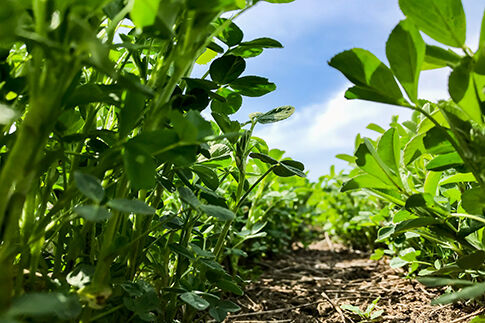Consider listing your corn residue acres on the Crop Residue Exchange

Most of Nebraska is currently in severe or extreme drought condition. Many livestock producers are looking for access to forage and winter feed resources. One resource that can help cattle producers get through the winter is corn residue grazing. Grazing is a great way to make use of corn residue rather than baling as it leaves the ground with more cover, does not result in compaction and returns most of the nutrients to the land. Sometimes grazing can increase crop yields.
The Crop Residue Exchange is designed to facilitate connections between livestock producers looking for forage and crop producers with available crop residues or other forage resources. This interactive, online exchange assists corn and other crop producers to market crop residue and other available forages to cattle producers for grazing.
Getting started with the Crop Residue Exchange
After establishing a log-in account, farmers can list cropland available for grazing by drawing out the plot of land available using an interactive map and entering basic information about the type of residue or forage, fencing situation, water availability and dates available. The mapping tool enables listings for the entire state of Nebraska and much of neighboring states Iowa, Missouri, Kansas, Colorado, Wyoming and South Dakota.
Land available for grazing is described as “Residue Type” (corn, wheat, sorghum, pasture or other). Pricing can be listed as a “cost per acre” or a “cost per head per day.” Farmers provide their preferred contact information. Livestock producers can search the Crop Residue Exchange database for grazing available within a radius for the location of interest, but must be logged in to view the contact information attached to each listing. Livestock producers can also save their search and receive notifications when new listings are posted that meet their search criteria.
With dry conditions in much of the western U.S., reports of livestock producers looking for fall and winter forage are accumulating. Crop producers who have previously listed crop residue available for grazing are encouraged to log in and update their listings on the Crop Residue Exchange.
Crop producers new to the Exchange are encouraged to consider utilizing the Exchange to connect with livestock producers to create a mutually beneficial relationship. For those who do make a connection, the Exchange also has a guide to assist when developing a rental agreement to help reduce miscommunication and misunderstandings.
The Crop Residue Exchange is made possible with funding support from Nebraska Extension, the Northern Plains Climate Hub and the University of Nebraska Institute of Agriculture and Natural Resources Beef Systems Initiative. Visit http://cropresidueexchange.unl.edu/.


